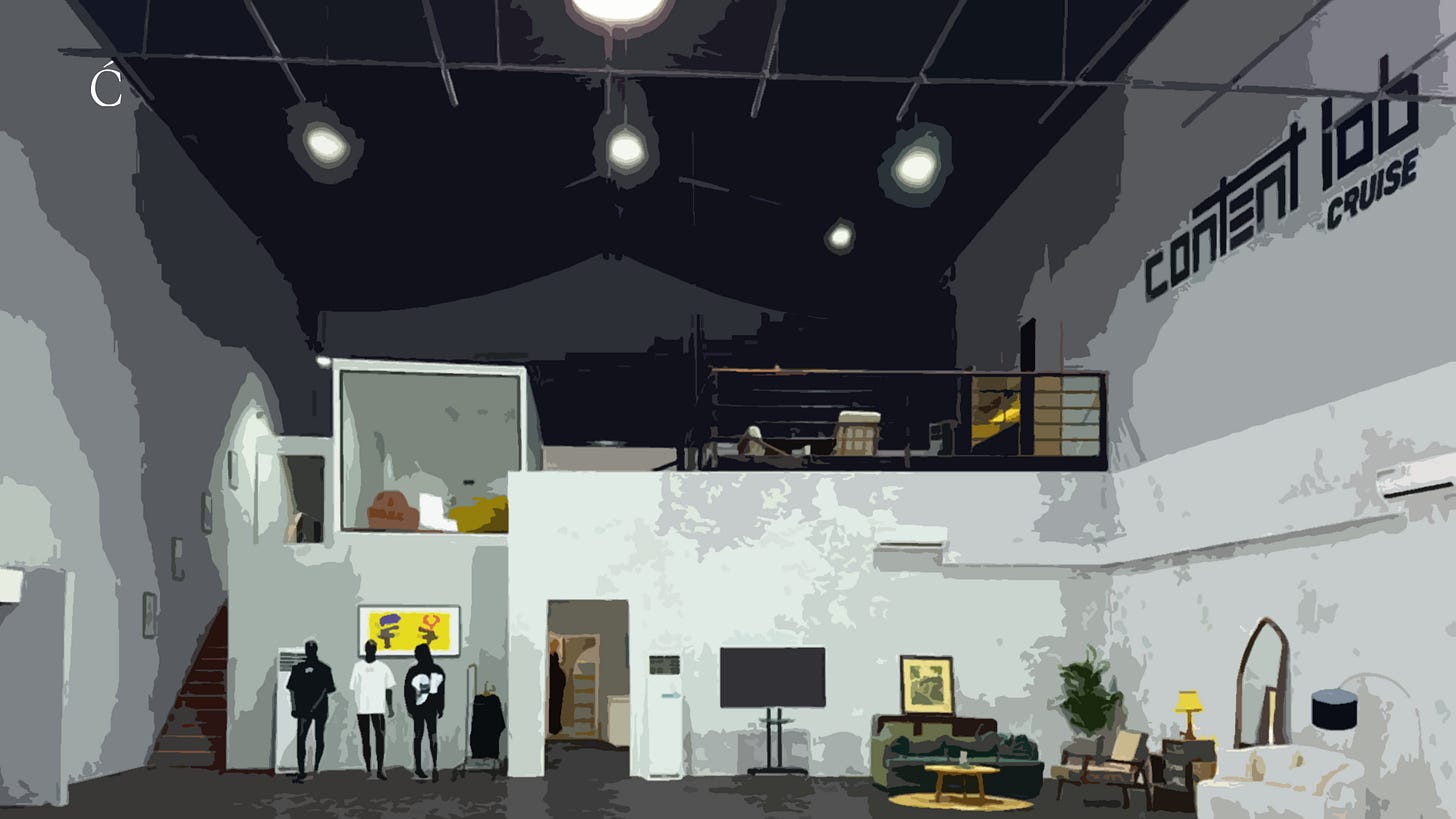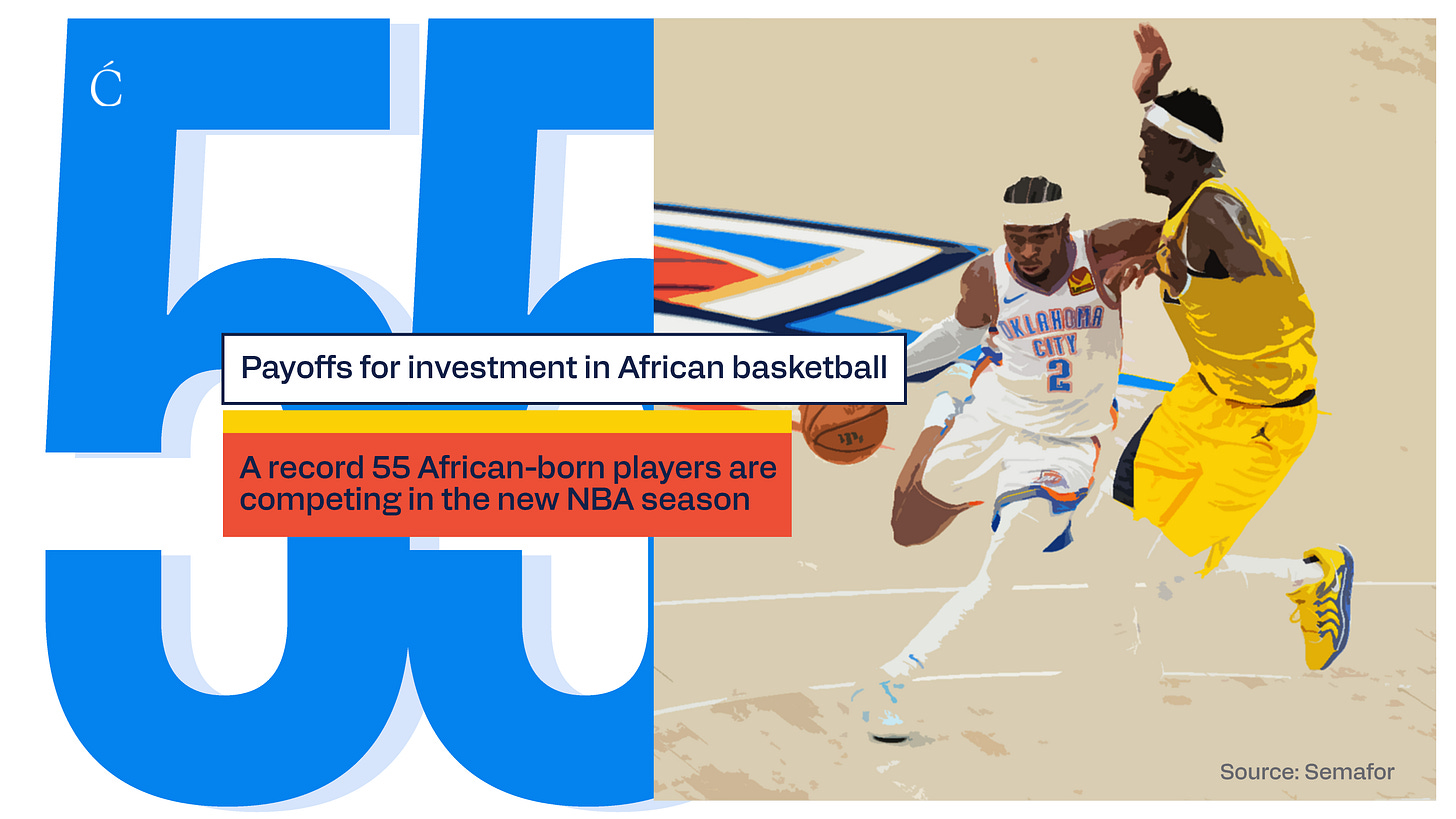Cruise’s big studio move + Nigeria’s IP reforms
Cruise opens a new studio to scale creator-led content; Nigeria’s IP policy promises stronger protections for the country’s creative economy.
Hello!
Every week, we follow the people, policies, and platforms shaping Africa’s media and creative economy, and we’re able to do it because readers like you value our thoughtful coverage. If you’d like to help keep this work going, you can lend your support here.
In this week’s Digest, we discuss:
Cruise’s new studio and new plans for growth
What the new Nigerian IP policy means for the country’s creative economy
Centre Spread 🗞️
Cruise bets on creator-led ecosystems
Nigerian YouTube sensation Cruise has opened Content Lab, a new studio located in a converted warehouse in Ikeja, Lagos. The space will now serve as the headquarters for both Cruise and IO Filmworks, the production company founded by Ibidunni Oladayo, the founder and creative director of Cruise.
Speaking at the opening ceremony on Saturday, Oladayo reflected on the brand’s journey from humble beginnings to one of Nigeria’s most-watched YouTube channels. “When we started, I was shooting in my sitting room because that was all we could afford,” he said. “This new space represents growth, not just for us, but for our entire community.”
Cruise’s journey mirrors that of global creators like MrBeast, who began making videos in his bedroom before moving to his first studio, a former church building he renovated for $1.3 million. Similarly, after producing Cruise’s first two videos in a rented space, Oladayo realised that renting continuously would make scaling the channel financially unsustainable. He transformed his living room into a makeshift studio space, and from that small setup, Cruise has grown to over 300,000 subscribers and nearly 30 million views in two years.
The new studio, a 500sqm facility, marks the next phase of Cruise’s evolution, positioning the company for larger productions and collaborations. It features two studios for video production, two make-up studios, and a conference room for production meetings. It will also double as a creative hub for other filmmakers and creators.
In Communiqué 59, we noted that “If Cruise also adapts Jubilee Media’s monetisation playbook, then we will likely see spin-offs of different verticals, such as love and dating verticals like Jubilee Media’s Nectar or a social party game developed around Cruise’s videos, similar to Jubilee Media’s Spectrum series.”
That prediction is now materialising. In addition to the new studio, Cruise is beta testing a dating app called Deep by Cruise, inspired by the company’s flagship dating show Playing Cupid. The app signals Cruise’s move beyond YouTube into interactive social entertainment products. This new venture confirms the company’s expanding ambitions and its intent to build a broader ecosystem around its growing community of fans and viewers.
Nigeria’s new intellectual property policy
Nigeria wants to add $10 billion annually to its GDP by 2030 and create one million jobs from the digital and creative economy. Last week, the Federal Executive Council (FEC) approved three policies designed to power that ambition: the National Intellectual Property Policy and Strategy (NIPPS), the ratification of the AfCFTA Protocol on Digital Trade, and the establishment of a national coordination mechanism for services exports.
Of the three, NIPPS may prove the most consequential for the creative economy. It is an attempt to build a coherent and functional IP framework in a country where weak enforcement and fragmented registries have enabled piracy and stifled investment.
The policy proposes consolidating existing IP registries into a new agency, the Nigerian Intellectual Property Commission. It also plans to automate IP systems, establish dedicated tribunals, and introduce standalone enforcement legislation to strengthen the legal backbone of Nigeria’s IP landscape.
Notably, the policy recognises the need for IP literacy. It outlines training programmes to help creators understand how to register, manage, license, and commercialise their work. For creative industries, this signals a shift towards more formal copyright registration and stricter enforcement. Creators may face higher compliance costs and additional administrative steps, such as registering works, documenting collaborations, and working more closely with collective management organisations like the Musical Copyright Society Nigeria (MCSN). However, the trade-off could be better ownership records, improved royalty structures, and stronger legal protection, which would be attractive to investors.
Still, gaps remain. The policy barely addresses digital-era complexities, including streaming royalties and AI-generated content. The proposed implementation timeline is quite optimistic, given Nigeria’s bureaucratic pace. Notably, the final draft was completed in 2022 but approved only in 2025, so the changes may not materialise anytime soon.
Crunch Time 📈
Curiosity Cabinet 🗄️
South Africa’s public broadcaster needs an urgent reinvention to stay alive, and it is betting on its streaming platform, SABC+, to be the catalyst. This week’s Communiqué essay examines how the broadcaster arrived at this point and assesses the viability of its plan to survive.
In this week’s edition of Offscript, OluwaMayowa Idowu, Culture Custodian’s co-founder and Editor-in-Chief, shares how he is building Nigeria’s leading youth culture publication.
Nollywood’s newest solution to fill the funding gap left by streaming platforms: brand collaborations.
Operating streaming services in Africa is uniquely challenging, and it’s not just about consumers’ budgets. “The physics of data transmission and the economics of content production create barriers that technology alone cannot overcome,” says the CEO of Ethiopia’s leading private broadcaster, KANA TV.
Here are the events happening across Africa’s creative economy this weekend and next week:
November 14 –16: Play to Win music business summit holds in Lagos, Nigeria.
November 19: Creative Business Summit Nigeria holds in Lagos, Nigeria.
Explore more of Africa’s creative economy in one place. Communiqué’s African Creative Economy Database tracks 1,000+ companies, events, investors, and government actors across the continent.
Thank you for reading Communiqué! Help us give Africa’s media and creative industries the coverage they deserve by donating here.
That’s it for this week’s Digest. See you next week.





